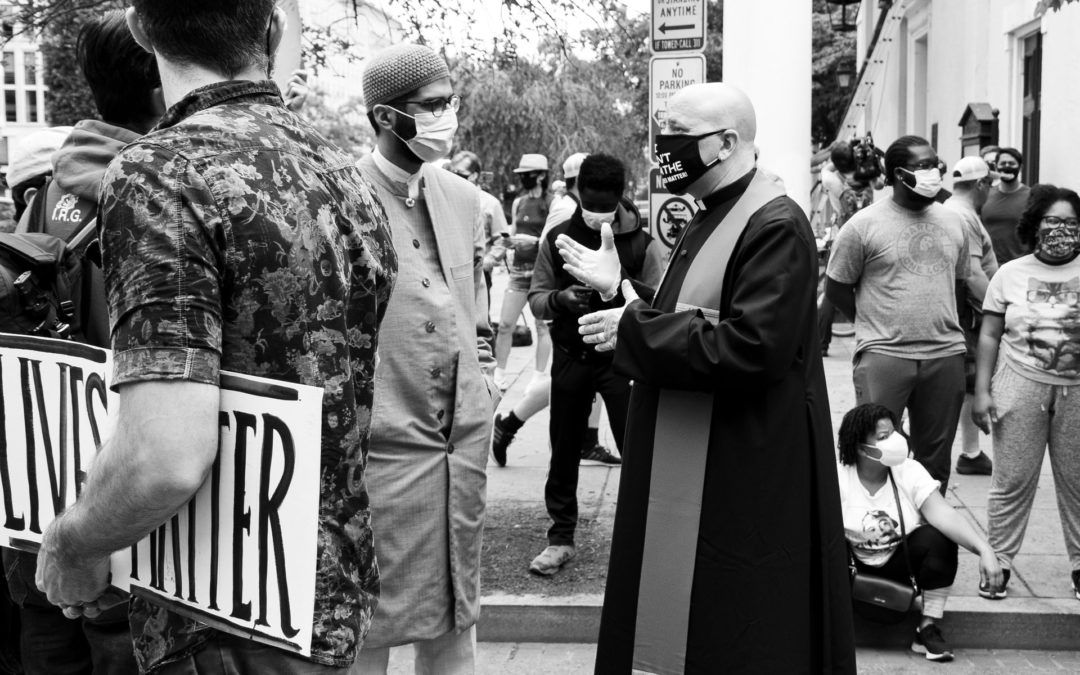In this week’s blog, our Poet Theologian in Virtual Residence Hannah Stone reflects that we are no longer at a stage where Covid 19 is everything to us because other events and issues are impinging on our consciousness in lockdown.
![]() Modern modes of communication include a lot of non-verbal signifiers, such as emoticons. With lockdown, a new one appeared, representing ‘we are all in this together.’ It looks like arms hugging a heart. Alongside this comforting message, there is also awareness that the pandemic we’re living through affects different people in different ways; whilst we may aspire to the teaching of Galatians 3.28 (There is neither Jew nor Greek, there is neither slave nor free, there is neither male nor female, for you are all one in Christ Jesus), evidence shows that some members of our society (including the elderly, already unwell, poorer) are disproportionately vulnerable to the virus and its most serious effects. Members of BAME communities are also at risk. We may be ‘in it together,’ but not suffering equally in the burden that it imposes.
Modern modes of communication include a lot of non-verbal signifiers, such as emoticons. With lockdown, a new one appeared, representing ‘we are all in this together.’ It looks like arms hugging a heart. Alongside this comforting message, there is also awareness that the pandemic we’re living through affects different people in different ways; whilst we may aspire to the teaching of Galatians 3.28 (There is neither Jew nor Greek, there is neither slave nor free, there is neither male nor female, for you are all one in Christ Jesus), evidence shows that some members of our society (including the elderly, already unwell, poorer) are disproportionately vulnerable to the virus and its most serious effects. Members of BAME communities are also at risk. We may be ‘in it together,’ but not suffering equally in the burden that it imposes.
Recently, the murder of George Floyd in Minneapolis shook us out of a focus on the pandemic, reigniting consciousness of a different manifestation of inequality affecting people of colour. All over the world, people congregated to raise awareness that Black Lives Matter. Besides this possibly paradigm-shifting, global public outcry at injustice and oppression, other recent much-publicised local infringements of lockdown protocol faded into insignificance. Whatever the rights and wrongs of breaking lockdown in order to protest, there was a sense that people wanted to show unity with the oppressed. I am proud that Leeds City Council supported the 8for8 event, inviting people at 8pm for 8 minutes to ‘take the knee’ or hold their hands in Namaste outside their house in a socially distanced manner (just as we corporately clapped for our carers), or if staying inside make any other gesture of peace and harmony. This gesture was perhaps no more powerful than a huggy emoticon, but it was a way of showing togetherness, and a desire to share and engender harmony between different people.
British-Syrian poet Amir Darwish’s poetry collection Don’t Forget the Couscous (Smokestack Books,2015) is a poignant, tender, book about belonging to multiple cultures. The opening poem ‘Sorry!’ is a tongue-in-cheek ‘apology from Muslims’ for all the things their culture brought to western society:
‘Sorry for all the words we throw at you;
Amber, candy, chemistry, cotton, giraffe, hazard,
Jar, jasmine, jumper, lemon, lime, lilac …
We are sorry for all the food we brought over:
From tuna to chicken tikka masala,
Hummus,
Falafel,
Apricot,
Doner kebab
Right up to the Shawarma roll.
And don’t forget the couscous.’
It’s hard to know where to begin with addressing the global issues presented by the pandemic – financial, social, environmental. There is great uncertainty for us all. Because of lockdown, we’re still tending to make more of our food at home than perhaps we did previously. Perhaps as we reach for a spice jar, or open the door to receive a delivery of pizza or curry, we might remember there is no east nor west in Christ; we are one human race. And we are all hungry for justice.

